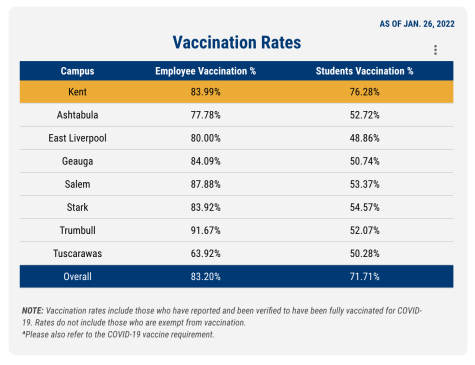Kent State releases COVID-19 vaccination rates for all campuses
February 4, 2022
In an email sent to the Kent State community, President Todd Diacon addressed vaccination rates and where the university stands in the midst of the COVID-19 pandemic.
“I can say without hesitation that there is good news to report to our Kent State community,” Diacon said. “Our strategy for addressing the challenges of the pandemic is working.”
Diacon said COVID-19 cases on campus were far lower than projected for the spring semester. He said this was partly because such a large percentage of the university community is vaccinated.

Starting Feb. 3 people will be able to access and track vaccination rates on Kent State’s COVID-19 Dashboard. More than 83 percent of employees and 72 percent of students are fully vaccinated against the virus campus-wide, as of Jan. 26.
Kent campus has the highest rate of vaccination with more than 76 percent of the student population and more than 83 percent of employees fully vaccinated.
“I think it’s even more important to have higher vaccination rates on our Kent campus because we have a residential population,” Diacon said. “Our regional campuses do not have residence halls, they don’t have a residential population.”
Roughly 56 percent of the population who lives in Ohio are fully vaccinated against the virus. However, 61 percent of people in Ohio have received at least one dose of the vaccine as of Feb. 3, according to data from the Ohio Department of Health. 55 percent of Portage County residents are fully vaccinated.
“I’m pleased at the vaccination numbers in the sense that all of our campuses have higher vaccination rates than the counties in which they are located,” Diacon said. “I think that’s a great indicator that our Kent State students and our Kent State staff and faculty are really buying in to the efficacy of vaccines.”
Diacon said the university will continue to pursue its current strategy and push for full compliance with the vaccine requirement.
“We know that vaccines work,” Diacon said. “They help stop COVID-19, and they help prevent serious illness and hospitalizations for those who get breakthrough cases.”
Joshua Bailey is a reporter. Contact him at [email protected].











